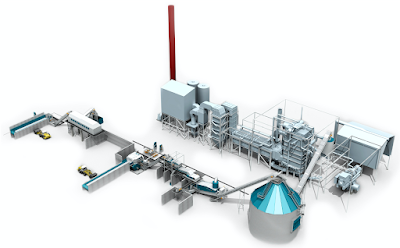Fueling Sustainability: Harnessing Waste to Fuel Technology
 |
| Waste to Fuel Technology |
In the global pursuit of sustainable energy solutions, waste
to fuel technology has emerged as a promising avenue for addressing both
environmental concerns and energy demands. This innovative approach involves
the conversion of various types of waste materials into valuable energy
sources, thereby reducing reliance on finite fossil fuels and mitigating the
environmental impacts of waste disposal.
At the core of waste to fuel technology lies a diverse range
of processes and methodologies designed to extract energy from waste streams.
One such method is anaerobic digestion, a biological process in which
microorganisms break down organic waste in the absence of oxygen, producing
biogas as a byproduct. Biogas, primarily composed of methane and carbon dioxide,
can be utilized for electricity generation, heating, and even as a vehicle
fuel, offering a renewable alternative to traditional fossil fuels.
Thermochemical conversion processes, such as gasification and
pyrolysis, represent another key aspect of Waste
to Fuel Technology. These methods involve the application of heat to
chemically transform waste materials into syngas, bio-oil, or other synthetic
fuels. By converting biomass, plastics, and other organic waste into
energy-rich products, thermochemical conversion technologies offer a
sustainable means of energy production while minimizing environmental
pollution.
Furthermore, advancements in waste sorting and recycling
technologies play a crucial role in maximizing the efficiency of waste to fuel
processes. Mechanical and optical sorting systems enable the separation and
recovery of valuable materials from mixed waste streams, including metals,
plastics, and paper. By diverting recyclable materials from landfills and
directing them towards recycling and energy recovery facilities, these
technologies contribute to resource conservation and environmental
sustainability.
The implementation of waste to fuel technology also requires
supportive policies, infrastructure, and public engagement initiatives.
Governments can play a vital role in fostering the development of waste to
energy projects through regulatory frameworks, financial incentives, and
investment in research and development. Additionally, partnerships between the
public and private sectors can facilitate the deployment of waste to fuel
facilities and the expansion of renewable energy infrastructure.
Education and awareness-raising campaigns are essential for
promoting public acceptance and participation in waste to fuel initiatives. By
highlighting the environmental benefits, economic opportunities, and
technological advancements associated with waste to fuel technology,
stakeholders can inspire individuals and communities to embrace sustainable
waste management practices and support the transition towards a circular
economy.
Harnessing waste to fuel technology offers a promising
pathway towards achieving sustainability goals by simultaneously addressing
waste management challenges and advancing renewable energy production. Through
continued innovation, collaboration, and commitment to sustainability, waste to
fuel technology has the potential to play a significant role in shaping a more
resilient and environmentally responsible future.



Comments
Post a Comment